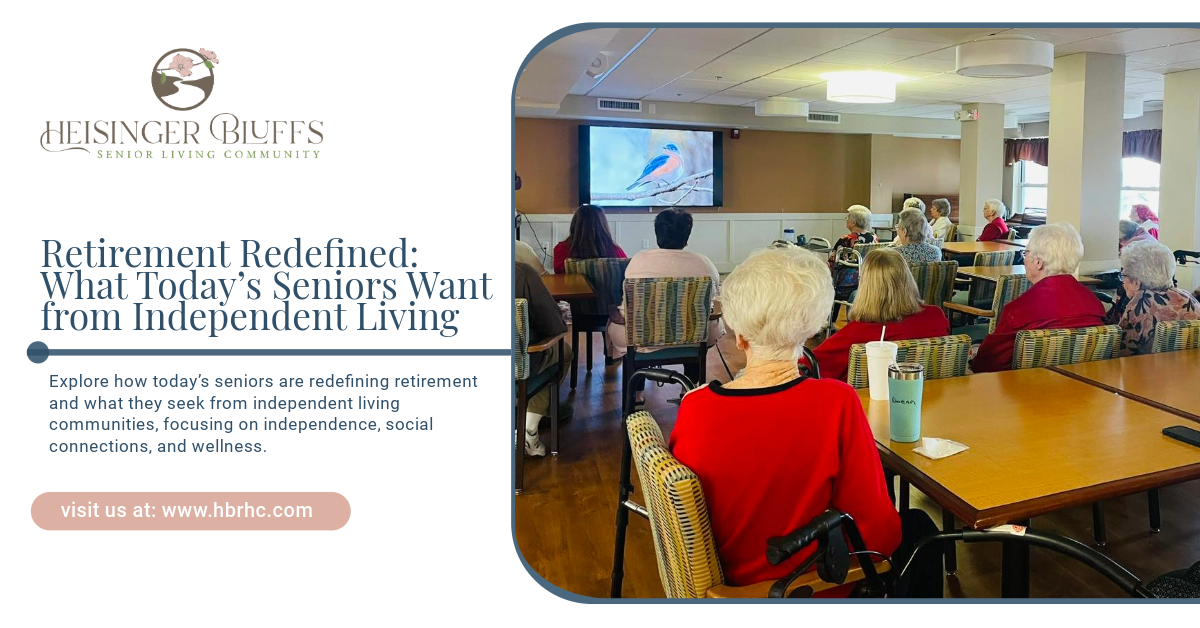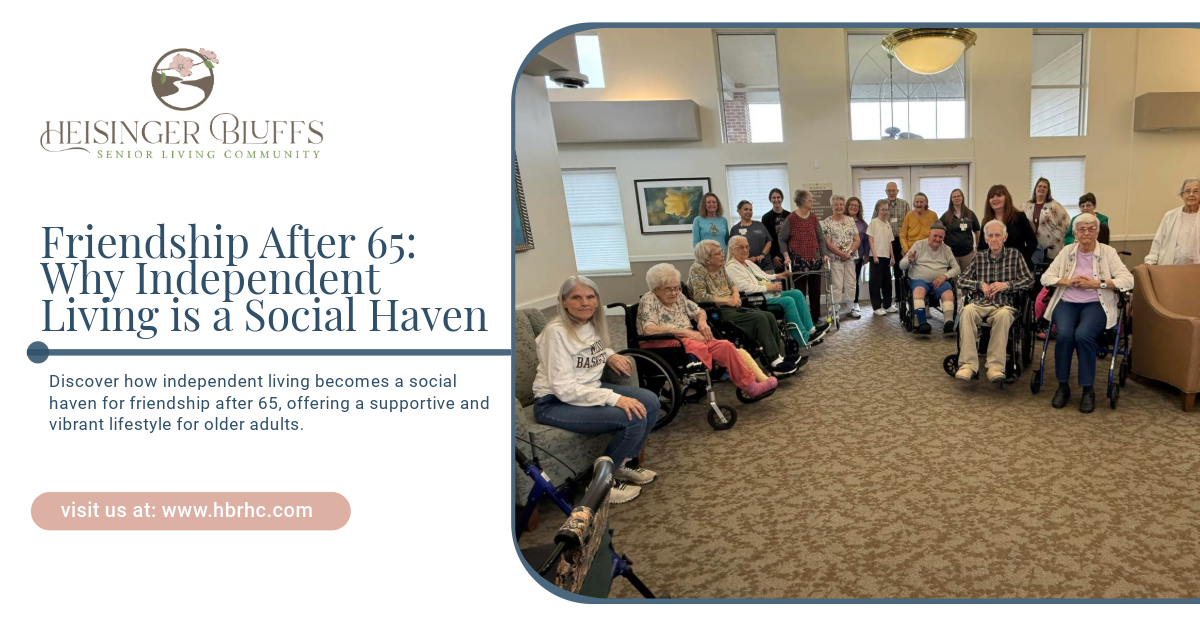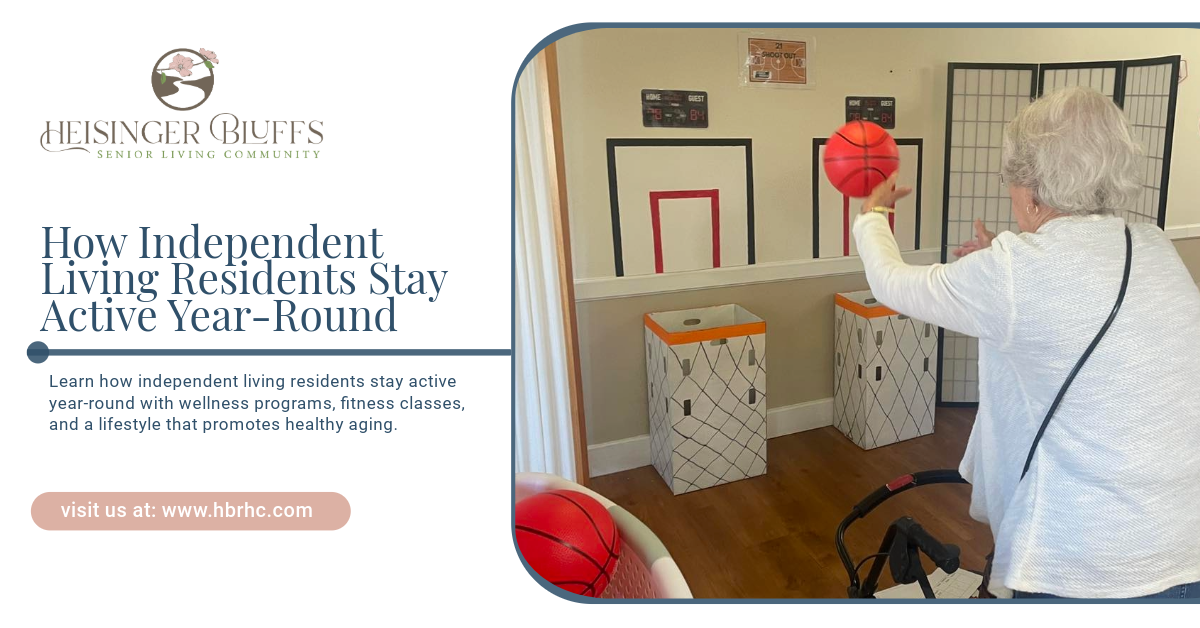Get in touch
Senior Living for Dementia Patients in Jefferson City, Missouri

Understanding Dementia Challenges in Jefferson City
Caring for individuals with dementia presents unique challenges that require specialized attention and approaches. The following sections will discuss the complexities associated with wandering behavior, mood disruptions, and nutrition challenges in those with dementia.
Wandering Behavior in Dementia
Wandering behavior is a common and serious concern for dementia patients, with six in every ten individuals with Alzheimer’s disease likely to wander or walk without purpose. This behavior can occur at any stage of the disease, even during early stages when patients might get lost in once-familiar settings like grocery stores or while returning home. Wandering can pose significant risks, such as the patient becoming lost or entering unsafe environments.
To address this concern, senior living facilities specializing in dementia care implement various safety measures. These can range from secured perimeters to advanced monitoring technologies designed to alert caregivers of potential wandering incidents. Understanding the triggers for wandering, such as discomfort or confusion, can also help caregivers prevent such situations. For more information on specialized care, visit our page on senior living for Alzheimer's patients.
Mood Disruptions and Dementia
Patients with dementia often experience mood disruptions, including agitation and anxiety. These disturbances can manifest at any point during the disease's progression and significantly impact the individual's ability to perform daily tasks. Mood disruptions that interfere with day-to-day activities signal a need for professional assistance from a physician.
Memory care communities offer environments specifically designed to reduce anxiety and agitation through structured routines and calming activities. Staff in these communities are trained to provide support and use techniques that help manage mood disruptions effectively. For those dealing with mood changes, exploring options such as assisted living for Parkinson's patients may be beneficial.
Nutrition Challenges in Dementia
As dementia progresses, patients may face difficulties with meal preparation, eating, and storing food properly. This can lead to poor nutrition, which in turn can result in weight loss, a decreased immune response, and impaired healing capabilities. Ensuring proper nutrition is essential for maintaining the health and well-being of dementia patients.
Senior living facilities tailored for dementia care often provide meal services that cater to the specific dietary needs of their residents. These services ensure that meals are not only nutritious but also easy to consume, taking into account any difficulties with chewing or swallowing that dementia patients may face. For more resources on specialized senior living options, consider exploring senior living for diabetes patients.
Addressing the challenges posed by dementia requires tailored solutions that cater to the unique needs of each individual. Specialized senior living communities play a critical role in providing the necessary care and support to enhance the quality of life for dementia patients.
Social and Psychological Impact to Senior Dementia Patients in Jefferson City, MO
The social and psychological ramifications of dementia are profound, impacting not only the individuals living with the condition but also their families and caregivers. Isolation and the potential for a diminished sense of community are significant concerns, which memory care communities in Jefferson City strive to address.
Isolation and Dementia
Isolation is a common issue for seniors with dementia, particularly as the disease progresses. The reduction in their ability to initiate and maintain social interactions can lead to a sense of loneliness, which may exacerbate symptoms of depression and precipitate a faster decline in cognitive function. For caregivers and family members in Jefferson City, Missouri, understanding this dynamic is essential when considering senior living for dementia patients.
Memory Care Communities Benefits
Memory care communities are designed to offer a supportive environment that mitigates the effects of isolation by fostering regular social interaction. They provide a range of activities and forms of entertainment tailored to the unique needs of individuals with memory impairments, thereby stimulating cognitive function and improving communication skills. These interactions not only enhance the residents' quality of life but also foster a sense of accomplishment and self-worth, potentially reducing the need for medications.
Residents of memory care facilities benefit from a structured social environment that helps to:
- Sustain feelings of belonging and purpose
- Improve mood and behavioral symptoms
- Promote better physical health through encouragement of exercise and improved nutrition
- Inspire participation in activities that match individual abilities and interests
Here are some specific advantages of memory care communities:
- Social Interaction: Activities are designed to encourage interaction, helping residents feel valued and supported.
- Creative Outlets: Engaging in music, arts, and reminiscence therapy allows residents to express themselves creatively and enhance their cognitive abilities.
- Life Skill Stations: These stations provide residents with the opportunity to engage in meaningful tasks, reflecting on past experiences and creating a sense of satisfaction.
By choosing a memory care community tailored to their loved one's needs, caregivers can ensure that their family member is living in an environment that prioritizes their social and psychological well-being. For those seeking specific care options, resources such as senior living for Alzheimer's patients, assisted living for Parkinson's patients, senior living for arthritis patients, and senior living for diabetes patients can provide valuable information to guide their decisions.
Activities and Therapies for Senior Dementia Patients in Jefferson City
For those living with dementia, engaging in suitable activities and therapies can have a significant positive impact on their well-being. These interventions are tailored to enhance cognitive function, maintain physical health, and foster social connections.
Cognitive Activities for Dementia
Cognitive activities are designed to stimulate the brain and can help slow the progression of dementia symptoms. These activities often focus on memory, problem-solving, and attention skills. Recreational activities have proven effective in reducing behavioral symptoms, particularly during the mild to moderate stages of the disease. Such activities should be individualized based on personal interests and functional abilities.
Activities like puzzles, memory games, and simple tasks broken into steps can provide a sense of accomplishment and purpose. It's also beneficial to involve activities that reflect the individual's former hobbies and interests to maximize engagement. For more information on cognitive activities tailored to dementia patients, consider reading about senior living for Alzheimer's patients.
Physical Activity for Brain Health
Regular physical activity is essential for maintaining brain health in individuals with dementia. Exercise can improve cardiovascular health, which in turn supports brain function. Activities such as walking, stretching, or light aerobics can be adapted to suit the individual's ability level.
The benefits of exercise extend beyond physical health; they also include a reduction in the risk of falls, improved mood, and better sleep quality. Recreational activities like dance, gardening, or supervised fitness classes can also serve as enjoyable physical activities that enhance overall quality of life.
Social Engagement Benefits
Social engagement is crucial for those with dementia as it helps combat feelings of isolation and loneliness. Interactive activities that promote socialization, such as group exercises, shared meals, and social events, contribute to a sense of community and belonging.
Therapies like music therapy, pet therapy, and sensory stimulation not only provide meaningful stimulation but also encourage interaction with others. The incorporation of these recreational programs promotes quality of life by providing an appropriate level of stimulation using meaningful activities. Additionally, the social aspect of these activities can have a calming effect on mood disruptions common in dementia patients.
It is important to note that the effectiveness of recreational activities in preventing behavioral symptoms of dementia is short-lived and needs to be provided continuously. Caregivers and family members should aim to balance these activities with periods of rest throughout the day to avoid overstimulation.
When considering senior living options for loved ones with dementia, it's essential to look for communities that offer a robust schedule of activities and therapies tailored to their needs. Such programs are integral to enhancing the quality of life for dementia patients. For further guidance on senior care options, explore resources on senior living for arthritis patients, assisted living for Parkinson's patients, and senior living for diabetes patients.
Memory Care vs. Assisted Living in Jefferson City, Missouri
Selecting the right care option for a senior with dementia in Jefferson City, MO requires understanding the differences between memory care and assisted living. Both provide essential support, but they cater to different needs and health conditions.
Differences in Care Approach
Memory care and assisted living differ significantly in terms of care approach due to the unique challenges faced by individuals with dementia. Memory care offers specialized support and is staffed with professionals trained to handle the complexities of cognitive impairments. These communities focus on providing a safe environment for residents to manage symptoms such as memory loss, wandering behavior, and mood disruptions.
Assisted living, on the other hand, generally caters to seniors who require assistance with daily activities but do not need the intensive, specialized care that dementia patients require. Assisted Living facilities may offer a broader range of services suitable for individuals with varying needs, such as those living with arthritis or diabetes (senior living for arthritis patients,
senior living for diabetes patients).
| Care Type | Focus | Staffing | Suitable For |
|---|---|---|---|
| Memory Care | Cognitive impairments, safety, specialized activities | Higher staff-to-patient ratio, specialized training | Dementia, Alzheimer's |
| Assisted Living | Daily living assistance, some medical support | General staff training | Various health conditions |
Specialized Environments in Memory Care
The design and environment of a memory care facility are tailored to meet the needs of seniors with dementia. Safety is a significant concern, as the risk of wandering is prevalent among dementia patients. Memory care facilities implement safety measures such as secured exits, wearable trackers, and constant monitoring to prevent wandering, which can pose a danger to seniors with cognitive impairments.
Additionally, the physical layout and decor are carefully considered to create a calming and navigable environment. Memory care units often feature therapeutic elements such as soft colors, minimal clutter, and clear signage to help residents feel more at ease and oriented.
Furthermore, memory care communities are designed with open common spaces and smaller private rooms to facilitate social interaction and provide a sense of community while also respecting the need for personal space. The approach to care in memory care facilities is driven by the understanding that a well-designed environment can have a therapeutic impact on residents' well-being.
Staff members in memory care units receive ongoing education to stay informed about the latest strategies for providing effective support to individuals with dementia. This specialized training equips them to deliver tailored activities that cater to the unique cognitive needs of residents, helping to minimize challenging behaviors and engage seniors in meaningful ways.
Choosing between memory care and assisted living involves considering the specific health conditions and care requirements of the senior. Memory care facilities offer an environment and level of care that are specifically designed to support seniors living with dementia, offering peace of mind and improved quality of life for both the individuals and their caregivers.
Cost and Coverage of Senior Living Options for Dementia Patients
When considering senior living for dementia patients, understanding the financial aspects is crucial. The cost of care in Jefferson City can vary significantly based on the type and level of care required, as well as the location of the facility.
Cost Disparities in Senior Living
The cost of senior living options can vary widely. According to Forbes, the median rate for assisted living facilities in the U.S. is $4,300 a month. However, for those requiring specialized dementia care, memory care facilities typically add 20% to 30% to the overall cost due to their enhanced services and security measures.
Location is a major factor in the cost of senior living. For instance, states like New Jersey and Delaware have an average cost well over $6,000 a month for assisted living. Conversely, Missouri offers more affordable options, with an average of about $3,000 a month.
| State | Assisted Living Monthly Average | Memory Care Monthly Average (20% increase) |
|---|---|---|
| New Jersey | $6,000+ | $7,200+ |
| Delaware | $6,000+ | $7,200+ |
| Missouri | $3,000 | $3,600 |
Financing Options for Memory Care
Managing the costs of memory care for dementia patients can be challenging, but there are several financing options available. Medicaid may cover some expenses for assisted living and memory care, particularly for those who qualify based on income and asset criteria. It's important to note that while Medicaid can be a resource, the extent of coverage may vary by state and by individual circumstances.
Medicare, on the other hand, typically contributes only to short-term medical treatments within a facility and does not cover the costs of residency. For long-term coverage, individuals might turn to long-term care insurance, personal savings, or veterans benefits.
Exploring all financing options is essential for caregivers and family members to ensure that their loved ones receive the necessary care without undue financial strain. Consider speaking with a financial advisor or a social worker specialized in senior care to navigate these options effectively. For those seeking specific care based on health conditions like Alzheimer's, arthritis, or mobility issues, additional resources may be available, such as senior living for arthritis patients and senior living for diabetes patients.
Understanding the cost disparities and financing options for memory care can help families and caregivers make informed decisions about the best care for their loved ones with dementia. With careful planning and consideration of the available resources, it is possible to find a balance between quality care and manageable expenses.
Workforce Training and Impact of Senior Living Facilities in Jefferson City, MO
The quality of care provided to individuals with dementia is critically dependent on a skilled and well-trained workforce. This section will discuss the importance of workforce training in enhancing the lives of those residing in senior living for dementia patients, and review the effectiveness of various training programs in Jefferson City, Missouri.
Importance of Skilled Workforce
A skilled, educated, and trained workforce is pivotal in improving the experience of persons living with dementia as well as their caregivers. From the moment of diagnosis to end-of-life care, a knowledgeable staff can greatly impact the quality of care and overall well-being of residents.
According to the Prime Minister’s Challenge on Dementia 2020 Implementation Plan, there has been significant progress in equipping the dementia workforce with vital skills through initiatives like the Core Skills, Education and Training Framework. This is essential because the demand for high-quality dementia care is expected to grow in tandem with the increasing prevalence and diagnosis rates of dementia.
By investing in proper training, facilities can ensure that their staff are not only competent in specialized care practices but also in delivering compassionate and person-centered care. This is especially vital in settings such as senior living for Alzheimer's patients, assisted living for Parkinson's patients, senior living for arthritis patients, and senior living for diabetes patients.
Effectiveness of Training Programs
Training programs for staff working with dementia patients have shown varying levels of effectiveness in improving the quality of life for residents. For instance, moderate-quality evidence from randomized controlled trials (RCTs) suggests that residential care staff who received training in managing challenging behaviors saw a reduction in agitation among dementia patients, compared to staff who did not receive specific training. However, these studies did not show a clear impact on aggressive behaviors, hospitalization rates, or prescription of psychotropic medications.
Additionally, moderate to high-quality evidence from up to five RCTs involving 941 individuals indicated improvements in quality of life and levels of agitation in dementia patients when care staff were trained in person-centered care approaches. Despite these positive outcomes, low-quality evidence was unable to show a definitive impact on behavioral and psychological symptoms of dementia.



Want to know more?
We will get back to you as soon as possible.
Please try again later.
You May Also Like To Read
Heisinger Bluff’s Life Plan Community is here to make your senior years safe, stimulating and enjoyable so that you can savor the present, knowing the future will be taken care of.
QUICK LINKS
CONTACT
©2024. Heisinger Bluffs. All rights reserved.








